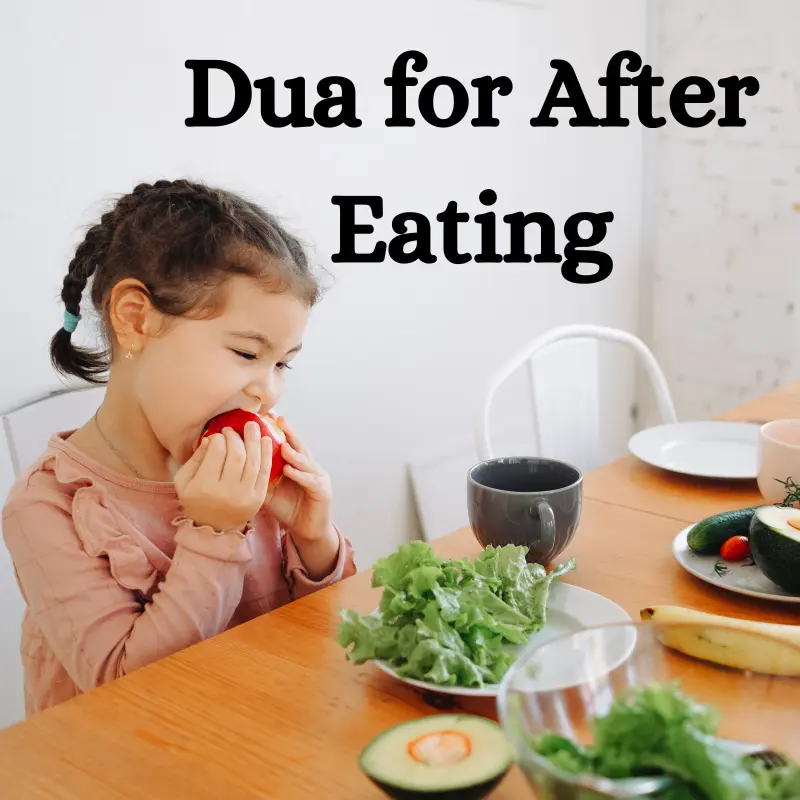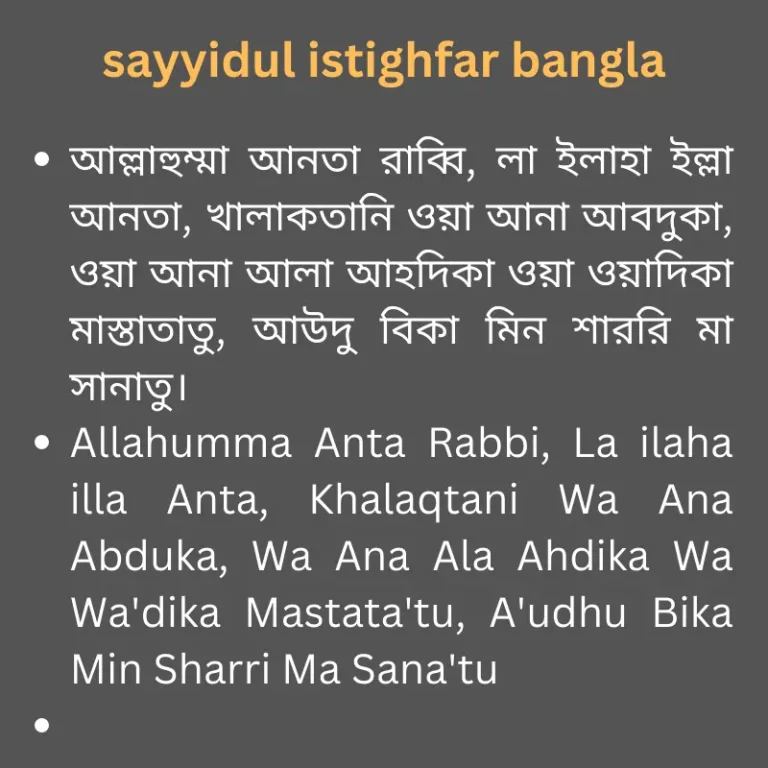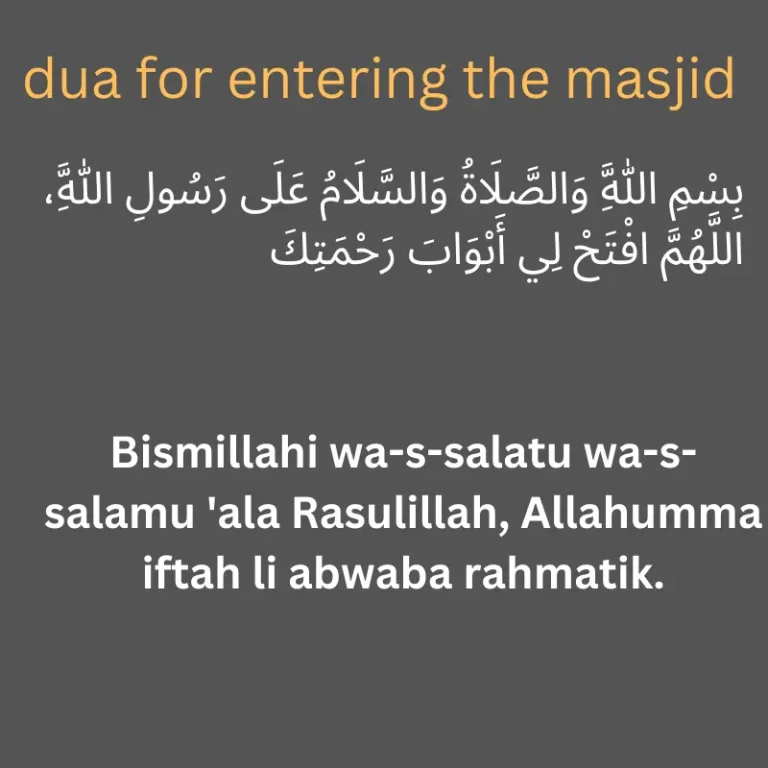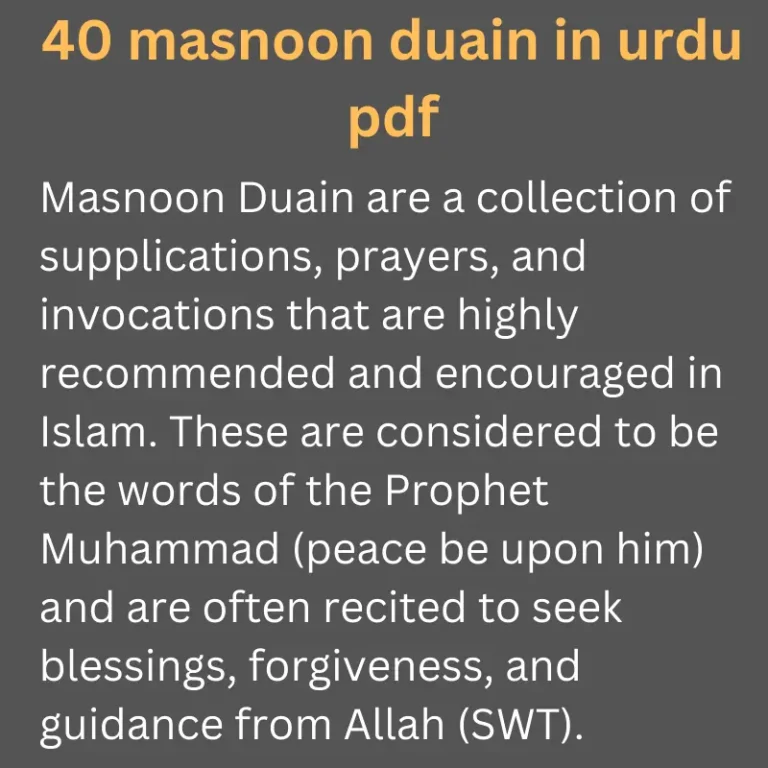Dua for After Eating
Eating is a fundamental aspect of our lives, providing nourishment and sustenance to our bodies. In Islamic tradition, every action is an opportunity to connect with Allah (God), and this includes eating. Engaging in a dua after eating is a way to express gratitude for the provision of food and seek blessings. In this article, we will delve into the significance of dua after eating and explore its spiritual and mindful dimensions.
Dua For After Eating In Arabic
“الْحَمْدُ لِلَّهِ الَّذِي أَطْعَمَنَا وَسَقَانَا، وَجَعَلَنَا مُسْلِمِينَ”
Dua For After Eating In English
Alhamdu lillahi alladhi at’amana wa saqana, wa ja’alna muslimin.
Translation:
Praise be to Allah who has fed us and provided us drink, and made us Muslims.
The Act of Eating in Islam
Eating in Islam is not merely a physical necessity but a way to sustain the body and draw closer to Allah. Muslims are encouraged to follow the Sunnah (the teachings and practices of Prophet Muhammad) when it comes to eating. This includes using the right hand, mentioning the name of Allah before starting, and eating together in a communal manner.
Benefits of After Eat Dua
Reciting dua after eating holds several benefits for individuals who practice it. Some of the benefits include:
- Gratitude: The dua encourages a sense of gratitude towards Allah for the food and drink provided, reminding individuals of the blessings they have received.
- Awareness of Blessings: Reciting the dua helps individuals become more mindful of the abundance of food and drink they have, fostering a greater appreciation for the provisions they enjoy.
- Spiritual Connection: Engaging in this supplication strengthens the spiritual connection between individuals and their Creator, as it’s a moment to acknowledge Allah’s role in sustaining their lives.
- Cultivation of Humility: Reciting the dua humbles individuals by acknowledging their dependence on Allah for their sustenance, fostering a sense of humility and modesty.
- Consistency in Worship: Incorporating this practice into one’s routine reinforces the habit of engaging in regular acts of worship, which can contribute to overall spiritual growth.
- Mindful Consumption: The dua serves as a reminder to eat and drink in moderation, as it encourages individuals to be conscious of what they consume and to avoid wastefulness.
- Positive Outlook: By expressing gratitude and focusing on the positive aspects of their lives, individuals may develop a more optimistic outlook on life.
- Reflection and Contemplation: Reciting the dua provides a moment of reflection, allowing individuals to consider the origin of their sustenance and the significance of their meals.
- Reminder of Faith: The dua serves as a reminder of one’s faith and the teachings of Islam, helping individuals maintain their connection to their religious beliefs.
- Cultivation of Mindfulness: Engaging in the after-eat dua encourages mindfulness not only in terms of food consumption but also in various aspects of life.
- Community and Family Bonding: Reciting the dua together with family or fellow believers can foster a sense of community and strengthen bonds through shared religious practices.
- Stress Relief: Taking a moment to recite the supplication after a meal can provide a brief pause in the day, offering a source of tranquility and stress relief.
Incorporating the after-eat dua into one’s routine can have both spiritual and psychological benefits, reminding individuals of their blessings, fostering a sense of connection to a higher power, and encouraging mindfulness in their actions.
Hadiths About Making Dua After Eating
Here are a couple of Hadiths (sayings of Prophet Muhammad) about making dua after eating:
The Prophet Muhammad (peace be upon him) said: “When any one of you eats, he should mention the name of Allah. If he forgets to do so at the beginning, he should say, ‘Bismillah awwalahu wa akhirahu (In the name of Allah at the beginning and at the end).'”
The Messenger of Allah (peace be upon him) said: “When a man eats some food and says: ‘Bismillah’ at the beginning and ‘Al-hamdu lillah’ at the end, a tree is planted for him in Paradise.”
Gratitude and Contentment
Expressing gratitude for the food we eat leads to contentment and a positive outlook on life. Dua after eating reminds us of the countless blessings we have and encourages us to appreciate them.
Enhancing Digestion Through Mindful Eating
From a health perspective, eating mindfully aids digestion. When we eat slowly and savor each bite, our bodies can process food more efficiently, leading to better overall well-being.
Scientific Perspective: Mindful Eating and Health
Modern science recognizes the benefits of mindful eating. It contributes to weight management, reduced stress, and improved digestion. Combining spiritual practice with mindful eating can have holistic benefits.
Personal Experiences with Dua After Eating
Many individuals share personal experiences of how the practice of dua after eating has positively impacted their lives. These stories highlight the spiritual, emotional, and psychological benefits of this simple yet powerful practice.
Dua after eating is a beautiful expression of gratitude, spirituality, and mindfulness. It reminds us that every morsel of food is a blessing from Allah and encourages us to cultivate an attitude of thankfulness in all aspects of our lives. By incorporating this practice into our routines, we embark on a journey of deeper spiritual connection and contentment.
What is the dua you say after eating?
In Islam, it’s customary to recite a dua after consuming food. The commonly recited dua is: “Alhamdulillahilladhi at’amana wasaqana waja’alna minal-muslimin” which translates to “Praise be to Allah, Who has fed us and given us drink, and made us Muslims.” This dua expresses gratitude for the sustenance provided and acknowledges one’s submission to Allah’s will.
What surah to read after eating?
After finishing a meal, it’s recommended to recite Surah Al-Ikhlas (Surah 112) three times. This short chapter emphasizes the oneness of Allah and His attributes, serving as a reminder of His greatness and our dependence on Him for sustenance.
What do you say after finishing eating in Islam?
Upon completing a meal, it’s encouraged to say “Alhamdulillah” (All praise is due to Allah). This expression of gratitude acknowledges Allah’s blessings and provisions, teaching believers humility and contentment in their blessings.
What Dua is Said After Eating According to Sunnah?
The Prophet Muhammad (peace be upon him) taught a dua to recite after eating: “Alhamdulillahilladhi at’amani hadha, warazaqanihi min ghairi haulin minni wa la quwwah” meaning “All praise is due to Allah, Who has fed me this, and provided it for me, without any strength or power on my part.” This dua emphasizes reliance on Allah’s mercy and recognizes our dependence on Him for sustenance.
What is the significance of Dua Al-Hamd?
Dua Al-Hamd is a dua recited after eating to express gratitude and acknowledge Allah’s blessings.
Can children learn to recite duas after eating?
Yes, teaching children duas after eating can help them develop a sense of gratitude and spirituality.
Is mindful eating beneficial for health?
Absolutely, mindful eating has both spiritual and health-related benefits, including improved digestion.
How does dua after eating contribute to contentment?
Dua after eating fosters gratitude, which in turn promotes contentment and a positive outlook on life.








